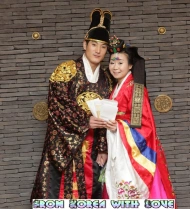What’s in a brand name?
 When I was in the Philippines, I didn’t care much about brand names. Even when I gave gifts to family and friends, I wasn’t very particular about the brand of the gift. Sure, I spent a lot of time searching for the best present, and it should have good quality, too, but the best present or a good quality gift doesn’t necessarily have to be pricey or luxurious. This is not the case in South Korea. Koreans care a lot about brands, and they don’t mind spending an awful lot of money on luxury brands or top-of-the-line products when they buy presents. Look around you, even in small towns, you will find brand name stores or shops selling expensive gift sets. Last weekend, we celebrated my 시어머님’s (si omonim: mother-in-law) birthday. My husband and I agreed that this year we would give her a gift instead of money, so I went to Lotte Depatment Store to buy her something special. As a 며느리 (myeonori: daughter-in-law), it’s my responsibility to prepare my mother-in-law’s present. It should be expensive. It should bear the name of a popular brand for 아줌마 (ajumma: a term for married or middle-aged woman). It took me three hours looking for the perfect pair of pants and blouse for her, but good thing, end-of-season sale has started, so I didn’t spend more than I expected. If I did, it wouldn’t have been such a big deal, because I like my mother-in-law, but then our bills… ugh!
When I was in the Philippines, I didn’t care much about brand names. Even when I gave gifts to family and friends, I wasn’t very particular about the brand of the gift. Sure, I spent a lot of time searching for the best present, and it should have good quality, too, but the best present or a good quality gift doesn’t necessarily have to be pricey or luxurious. This is not the case in South Korea. Koreans care a lot about brands, and they don’t mind spending an awful lot of money on luxury brands or top-of-the-line products when they buy presents. Look around you, even in small towns, you will find brand name stores or shops selling expensive gift sets. Last weekend, we celebrated my 시어머님’s (si omonim: mother-in-law) birthday. My husband and I agreed that this year we would give her a gift instead of money, so I went to Lotte Depatment Store to buy her something special. As a 며느리 (myeonori: daughter-in-law), it’s my responsibility to prepare my mother-in-law’s present. It should be expensive. It should bear the name of a popular brand for 아줌마 (ajumma: a term for married or middle-aged woman). It took me three hours looking for the perfect pair of pants and blouse for her, but good thing, end-of-season sale has started, so I didn’t spend more than I expected. If I did, it wouldn’t have been such a big deal, because I like my mother-in-law, but then our bills… ugh!
If you are giving your 시부모님 (si bumonim: parents-in-law) presents, make sure that you are ready to spend money for the best gift. We never cease to please the in-laws, especially on special occasions.
It’s all about the money!
The best gift to give your Korean parents-in-law is actually money, but then you can’t just give them any amount. I suggest, you buy them gifts for birthdays or Parents’ Day, and give money on the two most important occasions, Chuseok and Seollal. Giving money to the parents-in-law is mandatory on these two occasions. In my husband’s family, we bow to all the elders on Seollal, so we don’t give money only to my parents-in-law, but also to the eldest uncle. Some of his cousins give to other uncles, too. I told my husband that we are not rich to give money to all his uncles, so we give only to the eldest uncle, since he is the one who hosts the family gathering. My husband agreed. Traditional Korean families follow this custom of giving money to the elders. On the other hand, the elders give money to the children. (Read more about Seollal.)
Money as a gift is given not only on Chuseok and Seollal, but also on weddings and birthdays. Think of it this way: when you attend a wedding or a big birthday party like 돌 (dol: a baby’s first birthday), you are actually paying for the food you eat. Weddings in Korea and dol parties are very expensive, so many guests are invited to help shoulder the expenses.
How much money gift should I give?
 The money gift you give to your parents-in-law on Chuseok andSeollal depends on how generous you want to be, but the least amount of money should be 100,000 – 150,000 KRW (90 – 135 USD) for each of them.
The money gift you give to your parents-in-law on Chuseok andSeollal depends on how generous you want to be, but the least amount of money should be 100,000 – 150,000 KRW (90 – 135 USD) for each of them.
If you will be attending a wedding or a dol party alone, and you are not a close friend of the couple or the family, 30,000 or 50,000 KRW (27 or 45 USD) is a fair amount of money to put into the wedding envelope. Never give 40,000 KRW, as “4″ is considered an unlucky number in Korea. My husband and I always give 100,000 KRW (90 USD) to an acquaintance, because we are attending as a couple. To a friend, we don’t mind giving 150,000 or 200,000 KRW (135 or 180 USD). To a family member, we give more.
If you are very close to the couple getting married, you can give them a present instead of money. Just make sure the present is something that will be useful to them. Like I said earlier, it “can’t be just any gift”. Also, you may want to consider giving your money gift personally to the couple, instead of handing it in at the entrance of the wedding hall where the money gifts are received and recorded. The money gift you give to the person in charge of the registration will not go to the couple. The parents will use it to pay for the wedding. Some of my husband’s friends slipped their money gifts into my bag. Another friend who came late handed my husband his money gift. He didn’t go to the registration.
My husband’s boss put 1 million KRW (900 USD) into the envelope, but we didn’t have any idea that he gave a large amount until after our honeymoon. Guests with higher social status or high position in a company are expected to give bigger cash gifts. (I wonder if my husband and I will still be attending weddings when he’s already a CEO. ^^)
None of our money gifts on our wedding landed in our hands. That time, I thought it was fair, because my parents-in-law were the ones who paid for our wedding, but later, I’ve learned from my Korean friends that nowadays, some Korean parents give half of the money gifts to the couple to help them start their own savings. (Read more about money gifts in Korea.)
You can never go wrong with gold.
In Korea, the most generous first birthday gift you can give to a child (or his parents) is a 24-karat gold ring. Jewelry shops in Korea sell tiny gold rings, bracelets and other accesories for dol. Now why would you give gold to a baby? Koreans believe that gold does not depreciate, so it’s the most valuable gift you can give to a child. These days, however, only family and some close friends follow this tradition, as gold has become very costly. Most guests prefer to give money.
Are you meeting your Korean parents-in-law for the first time? Don’t forget the gift.
 When I came to Korea a month after my wedding, I brought presents for my husband’s family: bags for my mother-in-law and my sisters-in-law, belts for my brothers-in-law, and a special wine for my 시아버님 (father-in-law). My mom had been saving that wine for my father-in-law, because she heard that he likes wine. It’s a Chinese wine, but 아버님 (Abonim) didn’t drink it. I asked my husband why Abonim hasn’t even tasted it. He said it’s because it’s “made in China”. “It’s Chinese wine”, I told him, “not the cheap kind.” “It doesn’t matter,” he replied, “Next time, just buy him Johnnie Walker or Jack Daniels.” From then on, every time I come home to Korea after vacation, I buy 아버님 branded wine, whiskey or cognac. I also stopped giving my sisters-in-law bags. As mentioned earlier, brand names are quite important to Koreans. If the brand of the bag is not familiar to them, no matter how expensive the bag is, they would think it’s cheap. On the other hand, my other sister-in-law who had been to the Philippines many times appreciates Filipino-made bags. In fact, we went shopping for bags together in the Philippines. I sometimes see her using the bags I gave her. =)
When I came to Korea a month after my wedding, I brought presents for my husband’s family: bags for my mother-in-law and my sisters-in-law, belts for my brothers-in-law, and a special wine for my 시아버님 (father-in-law). My mom had been saving that wine for my father-in-law, because she heard that he likes wine. It’s a Chinese wine, but 아버님 (Abonim) didn’t drink it. I asked my husband why Abonim hasn’t even tasted it. He said it’s because it’s “made in China”. “It’s Chinese wine”, I told him, “not the cheap kind.” “It doesn’t matter,” he replied, “Next time, just buy him Johnnie Walker or Jack Daniels.” From then on, every time I come home to Korea after vacation, I buy 아버님 branded wine, whiskey or cognac. I also stopped giving my sisters-in-law bags. As mentioned earlier, brand names are quite important to Koreans. If the brand of the bag is not familiar to them, no matter how expensive the bag is, they would think it’s cheap. On the other hand, my other sister-in-law who had been to the Philippines many times appreciates Filipino-made bags. In fact, we went shopping for bags together in the Philippines. I sometimes see her using the bags I gave her. =)
Koreans prefer a gift from another country that is either rare or very expensive in Korea. If your mother-in-law likes jewelry, you can give her pearls. Pearls cost a lot here. Handmade or native bags also make a lovely gift. I rarely see Korean women use native bags. Omonim doesn’t wear jewelry, so I didn’t buy her pearls. She’s not crazy about bags either. My sister-in-law and I gave her bags and purses, but she rarely uses them. She’s a very simple woman who is not into accessories, so I always have a hard time preparing her gift… but unlike my father-in-law, she is more appreciative.
Abonim loves coconut wine, but Korea does not have this kind of wine. My country is famous for products made out of coconut, so every time hubby and I have our vacation in the Philippines, we buy coconut wine for Abonim, my brothers-in-law and our friends.
If you are meeting your parents-in-law for the first time, think of a product your country is best known for or something that can’t easily be found in Korea. (Read more about Korean parents-in-law.)
Although preparing gifts on the most important occasions in Korea can be stressful, there are times when you don’t need to break the bank just to please the person you are giving a gift to. Gift-giving here can also be simple, unpretentious, exciting and gratifying.
What can I bring when I visit a Korean family’s home?
 When your Korean friend invites you to his home, especially if it’s the first time, never go to his house empty-handed. It’s common courtesy. Flowers, fruits or wine are some of the gifts you can bring. If your friend has kids, you can prepare some goodies for them, too. When my husband and I visit his friends, even just for a drink, I make sure that we have something for them. In return, his friends sometimes send us gifts of fruit or food.
When your Korean friend invites you to his home, especially if it’s the first time, never go to his house empty-handed. It’s common courtesy. Flowers, fruits or wine are some of the gifts you can bring. If your friend has kids, you can prepare some goodies for them, too. When my husband and I visit his friends, even just for a drink, I make sure that we have something for them. In return, his friends sometimes send us gifts of fruit or food.
If you are invited to a housewarming party, the usual gifts to bring are laundry detergent, bundles of tissue or toilet paper, candles and matches or anything that is used in the house. Sometimes, Koreans give plants or flowers in pots.
If you are visiting on Chuseok or Seollal, there are gift sets in any supermarket or department store that you can purchase a few days before or during the holidays. The gift sets are usually food or drink, and their prices range from the affordable ones to the insanely overpriced items.
Is it really give-and-take?
Koreans are very thoughtful. They like to give the best and most lavish gifts. In return, they expect to get gifts of the same worth. (Read more about Korean thoughtfulness.)
My husband calls it give-and-take, but to me it is nothing like that. I believe that when you give a gift, you don’t expect anything in return. When you receive a gift, you appreciate it no matter how simple it is. Do you ever wonder why the amount of each money gift given on a Korean wedding is recorded along with the name of the giver? This is not done, so that the couple can send thank-you notes to the guests. The money gifts are recorded, so that the couple’s parents know who gave the least and the most amount, and of course, so that they can keep track of how much money was collected. When one of the guests gets married or has a big party, the couple (or his parents) can give the same amount that the guest has given them on their wedding.
Give-and-take is also practiced in the workplace. Simple favors are sometimes returned in the form of gifts. Traditionally, Korean businessmen give gifts to those who have assisted them or may help them in the future. It is also normal for businessmen to exchange gifts when they meet for the first time or make business deals. These are ways of establishing good business relationship in Korea.
This is the way Koreans say “Thank you”.
 When I was teaching in an international school, Korean parents would give teachers gifts even when there was no special occasion. At first, we were reluctant to receive the presents, but we were told by one of the Korean moms that giving gifts to teachers is normal in Korea. There was even a time when I was given money in a card envelope. I was thinking of giving the money back, but a Korean friend advised me not to do that, because returning a gift to a Korean parent is very rude. In other countries, accepting presents (or money gifts) from a student’s parent may be perceived as a form of bribery, but in Korea it is the parent’s way of saying “Thank you for teaching my child”.
When I was teaching in an international school, Korean parents would give teachers gifts even when there was no special occasion. At first, we were reluctant to receive the presents, but we were told by one of the Korean moms that giving gifts to teachers is normal in Korea. There was even a time when I was given money in a card envelope. I was thinking of giving the money back, but a Korean friend advised me not to do that, because returning a gift to a Korean parent is very rude. In other countries, accepting presents (or money gifts) from a student’s parent may be perceived as a form of bribery, but in Korea it is the parent’s way of saying “Thank you for teaching my child”.
Let’s say you offer your Korean colleague a sandwich. The next day, he brings you a lunchbox withkimbop (rice rolls), fruit or other lunchbox food. You can simply thank your thoughtful colleague or be extra nice by returning the lunchbox with food in it. (Read more about this topic.)
This month, we are going to celebrate Chuseok. I’m starting to save money for gift expenses. I grew up in a country where a simple gift, even one that doesn’t cost much, can easily make someone happy, but now I live in a country where there are higher standards set on gift-giving. Having lived in Korea for years, I’ve gotten used to the idea of giving a gift to show respect or establish rapport rather than to give a gift simply because you care.



Recent comments